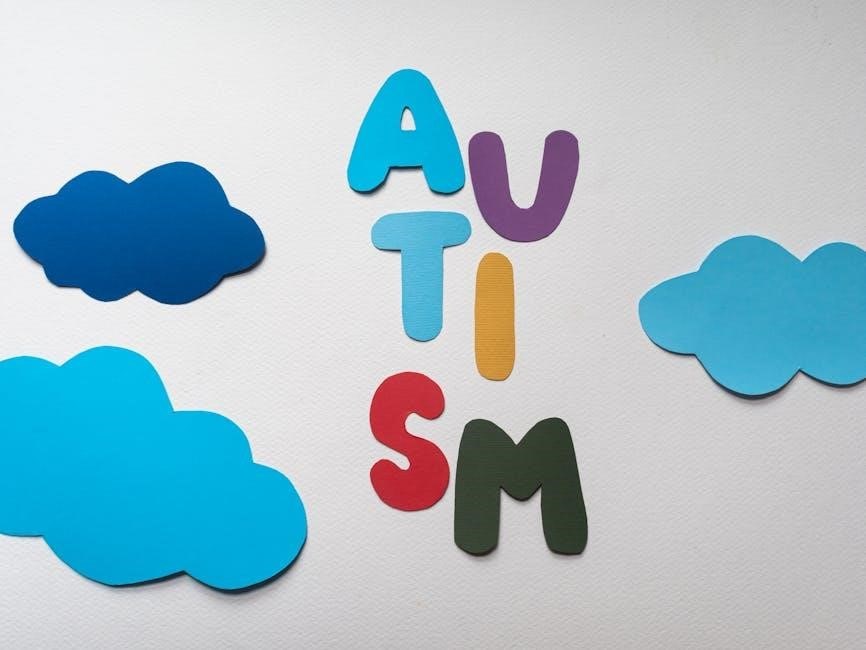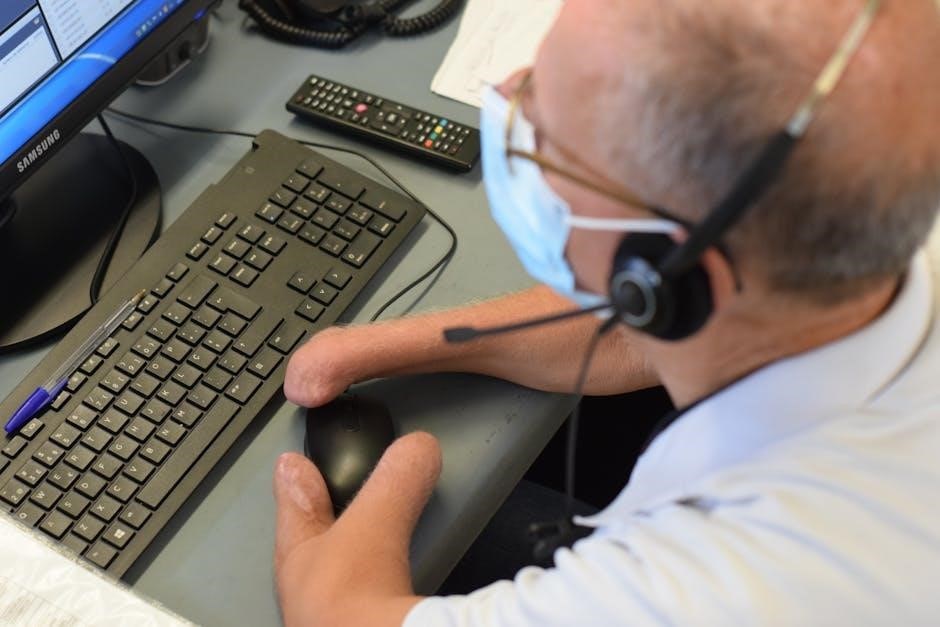disability support worker interview questions and answers pdf
Summary
Ace your disability support worker interview with proven questions, answers, and tips. Download the ultimate PDF guide for success in Australia.

This PDF guide provides essential insights into disability support worker roles, offering detailed interview questions, expert answers, and tips to excel in interviews and advance your career.
1.1 Overview of the Role of a Disability Support Worker
A Disability Support Worker (DSW) plays a vital role in assisting individuals with disabilities to lead fulfilling and independent lives. Their primary responsibilities include providing personal care, such as bathing, dressing, and feeding, as well as offering emotional and psychological support. DSWs also help clients with daily tasks, mobility, and communication, enabling them to participate in community activities and achieve their goals. The role requires a deep understanding of each client’s unique needs, preferences, and abilities, ensuring personalized support. Additionally, DSWs advocate for their clients’ rights and empowerment, fostering inclusion and dignity. This role demands empathy, patience, and strong interpersonal skills, as well as the ability to adapt to diverse situations. By providing compassionate care, DSWs make a significant difference in the lives of people with disabilities, helping them thrive in their communities.
1.2 Importance of Preparation for the Interview
Preparation is crucial when applying for a Disability Support Worker position, as it demonstrates professionalism and genuine interest in the role. Researching the organization and understanding its values ensures alignment with their mission. Practicing common interview questions helps build confidence and clarity in responses. Understanding the role’s demands, such as empathy, communication, and adaptability, allows candidates to highlight relevant skills. A well-prepared candidate can articulate their motivation and passion for supporting individuals with disabilities, showcasing their suitability. Additionally, preparation helps address potential challenges, such as scenario-based questions, by providing structured and thoughtful answers. Without proper preparation, candidates risk appearing unqualified or disengaged, reducing their chances of success. Adequate preparation not only enhances performance but also reflects a commitment to the role and the individuals they will support.
1.3 Benefits of Using a PDF Guide for Interview Preparation

A PDF guide for Disability Support Worker interview preparation offers numerous benefits, providing a convenient and organized resource for candidates. It allows for easy access to detailed interview questions, sample answers, and expert tips, enabling thorough preparation. The structured format helps candidates understand the types of questions they may face, such as general, role-specific, and scenario-based inquiries. Additionally, a PDF guide can be reviewed multiple times, allowing for consistent practice and reinforcement of key points. It also serves as a portable resource, making it ideal for on-the-go preparation. By leveraging a PDF guide, candidates can gain confidence, improve their responses, and present themselves as well-prepared professionals. This resource is invaluable for anyone aiming to excel in their interview and secure a fulfilling role as a Disability Support Worker.

Key Qualities and Skills Required for a Disability Support Worker
Empathy, communication, flexibility, and problem-solving are essential, alongside knowledge of disability support services, ensuring effective care and personalized support for individuals with diverse needs.
2.1 Empathy and Compassion
Empathy and compassion are cornerstone qualities for disability support workers, enabling them to understand and share the feelings of individuals with diverse needs. These traits foster trust and connection, allowing workers to provide personalized care that respects each client’s dignity. Compassionate support workers can navigate challenging situations with kindness, ensuring clients feel valued and supported. Empathy also enhances communication, helping workers identify and address unspoken needs. By genuinely caring for their clients, support workers create a safe and nurturing environment that promotes well-being and independence. These qualities are not only essential for building strong relationships but also for maintaining resilience in a demanding yet rewarding field. Active listening, non-verbal cues, and a non-judgmental attitude are key expressions of empathy and compassion in this role.
2.2 Communication Skills
Effective communication skills are vital for disability support workers, as they interact with clients, families, and healthcare teams. Clear and concise communication ensures understanding of client needs, preferences, and goals. Active listening is essential to build trust and rapport, while adaptability in communication style helps meet diverse client requirements. Using simple, accessible language and non-verbal cues, such as gestures and facial expressions, can enhance understanding for those with intellectual or sensory disabilities. Additionally, being able to articulate care plans and progress to supervisors or other professionals is crucial for coordinated support. Strong communication fosters collaboration, resolves conflicts, and ensures a client-centered approach. It also helps in de-escalating challenging situations and maintaining a safe, respectful environment. Developing these skills is key to providing empathetic and effective support, ensuring clients feel heard and empowered in their care journey.
2.3 Flexibility and Adaptability
Flexibility and adaptability are crucial qualities for disability support workers, as they often encounter unpredictable situations. Clients may have varying needs, preferences, or unexpected challenges, requiring immediate adjustments to care plans. A flexible approach allows support workers to respond effectively to changing circumstances, ensuring continuity of care. Adaptability also involves being open to learning new strategies or techniques to better support clients with diverse disabilities. For example, a client’s communication style or behavioral needs may change, demanding a swift and thoughtful response. Additionally, support workers may need to juggle multiple tasks, such as assisting with daily living activities, managing medical needs, and providing emotional support. Being adaptable ensures that clients receive person-centered care tailored to their unique requirements. This flexibility not only enhances client well-being but also fosters a positive and resilient work environment, enabling support workers to thrive in a dynamic and rewarding role.
2.4 Problem-Solving Abilities
Problem-solving abilities are essential for disability support workers, as they often face complex and unpredictable challenges. Clients may present unique needs or unexpected situations, requiring creative and effective solutions. Strong problem-solving skills enable support workers to assess situations, identify potential barriers, and implement strategies to overcome them. For instance, a client may resist a care plan, necessitating a supportive worker to adapt approaches while maintaining respect and empathy. Additionally, problem-solving involves critical thinking, resourcefulness, and the ability to remain calm under pressure. Effective problem-solving not only enhances client outcomes but also builds trust and confidence in the support worker’s capabilities. By demonstrating these skills, support workers can navigate challenges proactively, ensuring high-quality, person-centered care. This ability is vital in fostering independence, dignity, and overall well-being for individuals with disabilities.
2.5 Knowledge of Disability Support Services
Knowledge of disability support services is crucial for effectively assisting individuals with diverse needs. Understanding federal and state programs, community resources, and assistive technologies enables support workers to connect clients with appropriate services. Familiarity with legal rights, such as the ADA, ensures advocacy for clients. Recognizing the importance of inclusive environments and accessible care is vital. Staying updated on emerging trends, like telehealth for remote support, enhances service delivery. This expertise allows support workers to navigate complex systems, ensuring clients receive comprehensive and personalized care. Proficiency in these areas not only improves client outcomes but also demonstrates a commitment to empowering individuals with disabilities. By leveraging this knowledge, support workers can bridge gaps in care and foster greater independence for their clients.

Common Disability Support Worker Interview Questions
Common questions include scenario-based inquiries, communication skill assessments, and handling challenging situations, all designed to evaluate empathy, adaptability, and problem-solving abilities in supporting diverse client needs effectively.
3.1 General Interview Questions
General interview questions for disability support worker roles are designed to assess your suitability, motivation, and foundational skills. Common examples include inquiries about your understanding of the role, why you chose this career path, and how you handle challenging situations. Employers may ask, “What are your strengths and weaknesses?” or “Why do you want to work in disability support?” These questions help evaluators gauge your passion, empathy, and commitment to the field. Additionally, they may inquire about your previous experience, education, and how you align with the organization’s values. It’s important to prepare thoughtful answers that highlight your relevant skills and experiences. Practicing these questions beforehand ensures confidence and clarity during the interview. They also serve as an opportunity to showcase your ability to work compassionately and effectively with diverse client groups.

3.2 Role-Specific Questions
Role-specific questions in disability support worker interviews focus on your hands-on experience and skills relevant to the job. These questions explore your ability to provide direct care, manage challenging behaviors, and support clients with diverse needs. Examples include, “How would you assist a client with daily living tasks?” or “How do you ensure client safety and well-being?” Employers may also ask about your experience with assistive technologies or communication strategies for non-verbal clients; These questions help assess your practical knowledge and problem-solving skills in real-world scenarios. Be prepared to provide specific examples from your experience, such as helping a client achieve independence or de-escalating a difficult situation. Your answers should demonstrate empathy, adaptability, and a client-centered approach. This section of the interview is crucial for showcasing your suitability for the role and your ability to meet the unique needs of clients with disabilities.
3.3 Scenario-Based Questions
Scenario-based questions in disability support worker interviews test your problem-solving skills and ability to handle real-life situations. These questions present hypothetical challenges, such as managing a client’s behavioral outburst or responding to a medical emergency. For example, “What would you do if a client refuses to take their medication?” or “How would you handle a situation where a client feels isolated?” Employers use these questions to assess your critical thinking, empathy, and adherence to care protocols. When answering, provide clear, step-by-step responses that demonstrate your knowledge of disability support best practices. Highlight your ability to stay calm, prioritize client safety, and provide person-centered care. Be specific about strategies you would employ, such as de-escalation techniques or seeking additional support. These questions help employers evaluate your readiness to handle the complexities of the role effectively.
3.4 Questions About Previous Experience
Interviewers often ask about your previous experience to gauge your suitability for the role. Be prepared to discuss specific scenarios from your past jobs, focusing on how they relate to disability support work. For example, you may be asked, “Describe a time you supported a client with complex needs,” or “How did you handle a challenging situation in your previous role?” Use these opportunities to highlight your relevant skills, such as communication, problem-solving, and empathy. Emphasize your ability to provide person-centered care and adapt to individual needs. If you lack direct experience, discuss transferable skills from other roles, such as volunteering or caregiving. Be specific about your responsibilities and the positive outcomes you helped achieve. This demonstrates your capability to thrive in a disability support worker role and aligns your experiences with the employer’s expectations.
3.5 Questions About Working with Diverse Client Groups
Interviewers may ask about your experience working with diverse client groups to assess your ability to support individuals with varying disabilities, cultural backgrounds, and personal needs. Be prepared to discuss how you adapt your approach to meet the unique requirements of each client. For example, you might be asked, “How do you ensure inclusive support for clients from different cultural backgrounds?” or “Can you share an experience where you supported someone with a disability different from your previous clients?” Highlight your ability to provide person-centered care, respect individual preferences, and maintain a non-judgmental attitude. Emphasize your flexibility in using assistive technologies, communication strategies, and behavioral support techniques. Showcase your commitment to promoting independence, dignity, and equality for all clients, regardless of their background or disability. This demonstrates your readiness to work effectively in a diverse and inclusive environment.

Sample Answers to Disability Support Worker Interview Questions
This guide offers expert-crafted answers and practical strategies to help you confidently address common interview questions, ensuring you present your skills and experiences effectively.
4.1 Answering Questions About Your Motivation
When discussing your motivation for becoming a Disability Support Worker, emphasize your passion for empowering individuals with disabilities. Highlight how your personal values, such as empathy and compassion, align with the role. Share examples of experiences that inspired you to pursue this career, such as volunteering or witnessing the positive impact of support workers. Explain how your motivation drives you to help clients achieve independence and improve their quality of life. Be specific about what excites you about the role, whether it’s building meaningful relationships or advocating for inclusion. Demonstrating genuine enthusiasm and a commitment to the field will showcase your dedication to making a difference. Ensure your answer reflects a deep understanding of the challenges and rewards of the job, illustrating how your motivation fuels your desire to support others effectively.
4.2 Responding to Scenario-Based Questions
Scenario-based questions are designed to assess how you would handle real-life situations in a disability support role. To respond effectively, stay calm and think critically. Begin by understanding the scenario and the client’s needs. Use the STAR method (Situation, Task, Action, Result) to structure your answer. For example, if asked how you would support a client experiencing anxiety, describe the situation, outline your responsibilities, explain the actions you took, and share the positive outcome. Be specific about strategies you would use, such as calming techniques or redirecting focus. Highlight your problem-solving skills and empathy, demonstrating how you prioritize the client’s well-being. Show confidence in your ability to adapt to challenging situations while maintaining a person-centered approach. This will illustrate your readiness to provide effective support in diverse scenarios.

4.3 Highlighting Relevant Skills and Experience
When answering questions about your skills and experience, focus on demonstrating how they align with the role of a disability support worker. Emphasize qualities like empathy, communication, and problem-solving. For example, describe a time you supported a client with complex needs, highlighting your adaptability and patience. Use specific examples to showcase your ability to work independently and as part of a team. Mention any relevant certifications, such as first aid or disability-specific training, to strengthen your candidacy. Be clear about how your past experiences have prepared you to provide person-centered care and promote independence. Quantify achievements, like helping a client achieve a specific goal, to illustrate your impact. By connecting your skills and experiences to the responsibilities of the role, you can convince the interviewer of your suitability for the position and your commitment to the field.
4.4 Discussing Challenging Situations
When discussing challenging situations in an interview, focus on demonstrating your problem-solving skills and ability to remain calm under pressure. For example, describe a time you supported a client with complex needs or behaviors, highlighting how you assessed the situation, communicated effectively, and implemented a solution. Emphasize your commitment to the client’s well-being and safety. Be honest about the challenges you faced but frame them as opportunities for growth. Show how you collaborated with colleagues or other professionals to resolve the issue. Avoid blaming others or focusing solely on the difficulties; instead, highlight the positive outcomes and what you learned from the experience. This approach showcases your resilience, professionalism, and dedication to providing high-quality support. By framing challenges as learning opportunities, you demonstrate your ability to adapt and thrive in the role of a disability support worker;

4.5 Showcasing Your Knowledge of Disability Support
To effectively showcase your knowledge of disability support during an interview, highlight your understanding of inclusive care practices, legal frameworks, and person-centered approaches. Discuss your familiarity with disability rights, such as the Convention on the Rights of Persons with Disabilities, and how these principles guide your work. Emphasize your knowledge of assistive technologies, communication strategies, and behavioral support methods. Share examples of how you’ve applied this knowledge in previous roles, such as creating personalized support plans or advocating for clients’ needs. Demonstrate your awareness of the importance of cultural sensitivity and diversity in disability support. Highlight any relevant training or certifications, such as first aid or disability-specific programs. By linking your knowledge to real-world applications, you illustrate your readiness to provide effective, respectful, and empowering support to individuals with disabilities.

Tips for Acing a Disability Support Worker Interview
Research the organization, practice common questions, and demonstrate passion for the role. Use the STAR method to structure answers, showcasing relevant skills and experiences. Maintain a positive, confident demeanor throughout.
5.1 Researching the Organization
Researching the organization is crucial to understanding its mission, values, and approach to disability support. Visit their website to review their services, annual reports, and recent news. Understanding their specific programs and goals will help you align your experience and skills with their needs. Familiarize yourself with their commitment to inclusion, equity, and client-centered care. Knowing their values, such as promoting independence or fostering community integration, allows you to highlight relevant experiences. Additionally, explore their social media and recent projects to gain insights into their culture. This preparation demonstrates your genuine interest and enthusiasm for the role, making you a more appealing candidate. It also equips you with meaningful questions to ask during the interview, showcasing your engagement and readiness to contribute to their mission.
5.2 Practicing Common Interview Questions
Practicing common interview questions is essential to build confidence and reduce anxiety during your disability support worker interview. Review lists of frequently asked questions, such as those related to your motivation, communication skills, and handling challenging scenarios. Use resources like interview guides or PDF materials to familiarize yourself with the types of questions you may face. Practice answering role-specific questions, such as how you would support a client with specific needs or manage a difficult situation. Consider using the STAR method (Situation, Task, Action, Result) to structure your responses clearly. Additionally, seek feedback by conducting mock interviews with friends or mentors. This preparation will help you articulate your skills and experiences effectively, ensuring you present yourself as a capable and compassionate candidate. Regular practice also helps you stay calm and focused, allowing you to showcase your passion for the role confidently.
5.3 Demonstrating Your Passion for the Role
Demonstrating your passion for the role of a disability support worker is crucial during an interview. Highlight your empathy, compassion, and commitment to improving the lives of individuals with disabilities. Share personal stories or experiences that sparked your interest in this field, showcasing your genuine desire to make a difference. Discuss how your values align with the organization’s mission and how you strive to empower clients to achieve independence and inclusivity. Emphasize your belief in the importance of dignity, respect, and personalized support. Be specific about how you stay updated on disability rights, services, and best practices, reflecting your proactive engagement with the sector. Expressing your enthusiasm and dedication will help interviewers see you as a motivated and caring candidate who is ready to contribute meaningfully to the role. Authenticity and sincerity in your responses will leave a lasting impression, reinforcing your suitability for the position.
5.4 Using the STAR Method for Answering Questions
The STAR method is an effective way to structure your answers during a disability support worker interview. Standing for Situation, Task, Action, and Result, this technique helps you provide clear, concise, and impactful responses. Start by describing the situation you were in, then outline the task you needed to complete. Next, explain the actions you took to address the situation, and finally, share the result or outcome of your efforts. For example, when asked about a challenging client scenario, you might describe how you supported a client with specific needs, the strategies you implemented, and the positive outcome achieved. This method ensures your answers are organized, demonstrating your problem-solving skills, empathy, and commitment to client well-being. By using the STAR method, you can clearly showcase your experiences and qualifications, making a strong impression on interviewers.
5.5 Maintaining a Positive and Confident Attitude
Maintaining a positive and confident attitude is crucial during a disability support worker interview. Employers seek candidates who can remain upbeat and composed, even in challenging situations. Demonstrate enthusiasm for the role by sharing your passion for supporting individuals with disabilities. Highlight your ability to stay calm under pressure and approach difficulties with resilience. Confidence can be shown through body language, eye contact, and a firm handshake. Be prepared to discuss how you handle stressful scenarios, such as managing a client’s emotional crisis or navigating complex care needs. Showcasing a positive mindset and self-assurance will convey your readiness to thrive in this fulfilling yet demanding role. Remember, your attitude reflects your commitment to empowering clients and contributing to their well-being. A positive and confident demeanor will leave a lasting impression on interviewers, reinforcing your suitability for the position.
This guide empowers you with insights, questions, and strategies to excel in disability support worker interviews. Preparation is key to showcasing your skills and passion, ensuring confidence and success.
6.1 Recap of Key Points
This guide has provided a comprehensive overview of disability support worker interview questions and answers, equipping you with the tools to succeed. Key points include understanding the role, preparing thoroughly, and leveraging a PDF guide for structured learning. Essential qualities like empathy, communication, and adaptability were highlighted, along with common interview questions and sample answers. Tips for acing interviews, such as researching the organization and using the STAR method, were also emphasized. By focusing on your motivation, skills, and experience, you can confidently showcase your suitability for the role. Remember, preparation is crucial to standing out and demonstrating your passion for supporting individuals with disabilities. This guide serves as a valuable resource to help you navigate the interview process and advance your career in this fulfilling field.
6.2 Encouragement to Pursue the Role
If you’re passionate about making a difference in people’s lives, pursuing a career as a disability support worker can be incredibly rewarding. This role allows you to directly impact individuals with disabilities, helping them achieve independence, dignity, and fulfillment. The guidance provided in this PDF equips you with the confidence and knowledge to excel in interviews and secure a position in this meaningful field. By preparing thoroughly and showcasing your compassion, skills, and dedication, you can stand out as an ideal candidate. Remember, this role is not just a job—it’s an opportunity to advocate for inclusivity, empower others, and contribute to a more equitable society. Embrace this chance to make a lasting difference and take the first step toward a career that brings both personal and professional fulfillment.

6.3 Final Thoughts on the Importance of Preparation
Preparation is the cornerstone of success in any interview, and this is especially true for a disability support worker role. By thoroughly reviewing common interview questions, practicing your responses, and understanding the skills employers seek, you can confidently showcase your qualifications. This PDF guide provides a comprehensive toolkit to help you navigate the interview process effectively. It not only highlights key questions but also offers expert advice on how to articulate your experiences and values. Remember, preparation demonstrates your commitment to the role and your willingness to make a meaningful impact. By investing time in preparing, you’ll not only enhance your chances of securing the position but also set a strong foundation for a fulfilling career in disability support. Continuous learning and self-improvement are essential in this field, and preparation is the first step toward excellence.